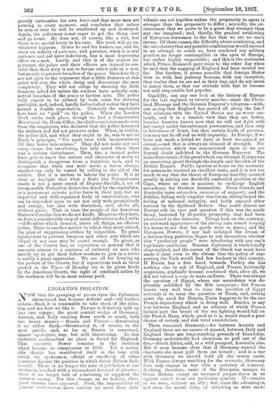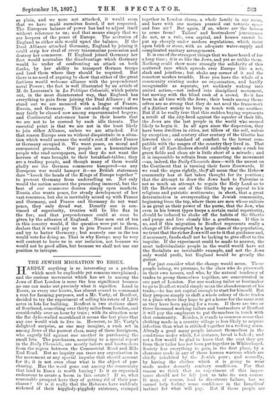ENGLAND'S ISOLATION. N OW that the grouping of- pieces upon the
diplomatic chess-board has become definite and—till further orders—final, it is reasonable to take stock of the situa- tion and see how we like it. Europe is definitely split up into two camps ; the great central wedge of Germany, Austria, and Italy running from north to south, with two heavy masses — Russia and France — threatening it on either flank,—threatening it, of course, in the most pacific, and, so far as Russia is concerned, almost apologetic, way, but still threatening. In this elaborate combination no place is found for England. That eccentric Power remains in the isolation which became so conspicuous in 1896. Yet a notice- able change has manifested itself in the tone with which the spokesmen, official or unofficial, of other countries discuss the position in which Great Britain finds herself. There is no longer the note of jubilation at our weakness, touched with a triumphant forecast of plunder ; there is no longer talk of combining to suppress the common enemy. For this change, as we believe, three good reasons have appeared. First, the impossibility of general combination, since nations no more than indi- viduals can act together unless the propensity to agree is stronger than the propensity to differ ; secondly, the cir- cumstance that we prove to be a great deal stronger than any one imagined ; and, thirdly, the gradual awakening of European statesmen to the fact that we are no one's enemy. Of these causes, the difficulty about combining, and the uncertainty that any possible combination would succeed in an attempt to crush us, have rendered our solitary position no longer contemptible in the eyes of Europe, but rather highly respectable ; and this is the sentiment which Prince Bismarck gave voice to the other day when he said that the nagging of England had been carried too far. But further, it seems possible that foreign States view us with less jealousy because, with one exception, they realise that we are not in their way, and do not mean to annoy them, so that our attitude bids fair to become not only respectable but popular.
Candidly, can any one look at the history of Europe for the last eighteen or twenty months—since the Cleve- land Message and the German Emperor's telegram—with- out seeing that England has gained all along the line ? Our relations with the United States are no worse cer- tainly, and it is a tenable view that they are better, because America knows now that we will not fight with her except under the extremest provocation, and then only in bitterness of heart, but that certain kinds of provoca- tion may not be offered us with impunity. In Europe, if we have not made a friend we have at least recognised an enemy,—and that is always an element of strength. For the attention which was concentrated upon us we are beyond doubt indebted to the German Emperor. The immediate result of the growlwhich ran through Europewas an answering growl through the length and breadth of the British Empire. Public opinion at home on the necessity for armament received an excellent tonic, and it is not too much to say that the threat of European hostility assisted greatly in salving our decidedly embroiled position at the Cape, where no one is anxious to exchange English ascendency for German domination. From Canada and Australia came outspoken assurance of support ; and the Jubilee, falling with singular timeliness, strengthened the feeling of national integrity, and fairly amazed other nations by the Spithead Review. One could almost see Europe rub its eyes and question if this was the senile decay, hastened by ill-gotten prosperity, that had been proclaimed to the universe. Things had, on the contrary, an awkward appearance of the strong man armed keeping his house to see that his goods were in peace ; and the European Powers, if any had indulged the dream of a far-reaching partition, began to ask themselves whether this "predatory people" were interfering with any one's legitimate ambitions. Russian diplomacy is traditionally clear-sighted, and the course of the Greek war must have made it clear even to the obtuse that the policy of sup- porting the Turk would find few backers in this country. If Russia has a free hand towards Turkey she has nothing else to ask of England, and France, habitually suspicious, gradually became convinced that, after all, we did not intend a coup de main on Crete. There was always the question of Egypt, where our ascendency was de- plorably solidified by the Nile campaign ; but France knows very well that to raise the question of Egypt seriously is to raise the question of Tunis, and, setting apart the need for Biserta, Tunis happens to be the one French dependency which is doing well. Besides, in any war between England and an alliance of which France formed part the brunt of the sea fighting would fall on the French Navy, which, good as it is, would stand a poor chance of victory, and risk total annihilation.
There remained Germany,—for between Austria and England there are no causes of quarrel, between Italy and. England there are long-standing grounds of friendship. Germany undoubtedly had chestnuts to pull out of the fire,—South Africa, and, in a wild prospect, Australia also. But it soon became clear that if Germany wanted the chestnuts she must pull them out herself ; and in a war with Germany we should hold all the trump cards. With France always watching for the revanche, Germany dare only engage in war with a certainty of winning. Nothing, therefore, came of the European menace to Great Britain except an increased preparedness in us against attack from one particular quarter. We remain as we were, without an ally ; but, since the advantages, and even the moral duty, of attacking us were made so plain, and we were not attacked, it Would seem that we have made ourselves feared, if not respected. The European balance or power has had to adjust itself without reference to us ; and that means simply that we are keepers of the peace of Europe. The accession of England to either side would upset the balance. If the Dual Alliance attacked Germany,. England by joining it could strip her rival of every transmarine possession and destroy her commerce. If England joined Germany her fleet would neutralise the disadvantage -Which Germany would be under of confronting an attack on both flanks, by her ability to transport German troops and land thee' where they should be required. But there is no need of arguing to show that either of the great factions would welcome alliance with the preponderant naval Power ; the fact is well illustrated by an article of M. de Lanessan's in La Politique Colcmiale, which points out, in the most disinterested way, that England has everything to gain from joining the Dual Alliance ; if we stand out we are menaced with a league of France, Russia, and Germany. This cat-and-dog combination may fairly be classed now among superannuated bogeys ; and Continental statesmen know in• their hearts that we are not to be coerced by such idle threats. The essential point is that we are not in the least likely to join either Alliance, unless we are attacked. For that reason Europe sees us without disquietude in a situa- tion which would menace the world's rest if either France or Germany occupied it. We want peace, on moral and commercial grounds. Our people are a humanitarian people who read newspapers, and they do not want the horrors of wars brought to their breakfast-tables ; they are a trading people, and though many of them would gladly see the German commerce hampered—as any European war would hamper it—no British statesman dare "knock the heads of the Kings of Europe together" to prevent Germany from underselling us. Not only would the nation account the proceeding immoral, but the best of our commerce desires simply open markets. Russia also wants peace, for steady development of her vast resources, but she is inevitably mixed up with France and Germany, and France and Germany do not want peace, they only dread war. Directly one is con- vinced of superiority, treaties -will be like flax in the fire; and that preponderance could at once be given by the adhesion of England. Nine men out of ten in this country would, if the question were put to them, declare that it would pay us to join France and Russia and try to batter Germany ; but scarcely one in the ten would vote for doing so. That is why Europe may be very well content to leave us in our isolation, not because we would not be good allies, but because we shall not use our position to intrigue.



































 Previous page
Previous page